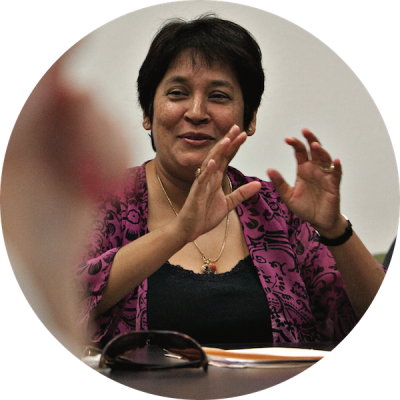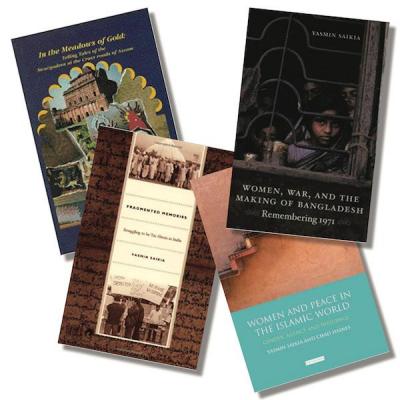
Peace Studies at ASU:
The Hardt-Nickachos Chair in Peace Studies
ABOUT | HISTORY | CHAIR OF PEACE STUDIES | EVENTS | PUBLICATIONS | PROJECTS | FOR STUDENTS
Meet Yasmin Saikia, Hardt-Nickachos Chair in Peace Studies
Professor Yasmin Saikia is the Hardt-Nickachos Chair in Peace Studies at the Center for the Study of Religion and Conflict and a professor of history in the School of Historical, Philosophical and Religious Studies. Her work focuses on the histories of memory and identity; women, war, and peace; histories of premodern and contemporary South Asia, and engaging the history of Islam and Islamic values of peace. With a specific focus on contestations and accommodations in South Asia between local, national, and religious identities, she examines the Muslim experience in India, Pakistan, and Bangladesh, and the discourse of nonviolence alongside the practice of violence against women and vulnerable groups. As the Hardt-Nickachos Chair in Peace Studies, she advances the study of peace with a more humanities-oriented approach by paying attention to culture, history, and individual and group agency.
Saikia’s expertise and innovative teaching techniques help students at Arizona State University understand peace as a dynamic process touching on dimensions that range from the inner to the interpersonal, and from the intergroup to the international. To encourage student participation she has developed several new classes that have never before been offered at ASU, covering topics ranging from Gandhi and the politics of non-violence to Muslim women’s peace movements.
Selected Publications
Saikia is the author of the award-winning books, In the Meadows of Gold: Telling Tales of the Swargadeos at the Crossroads of Assam (1997) and Fragmented Memories: Struggling to Become Tai-Ahom in India (2004). Her three-year oral history project focusing on the Bangladesh war of 1971 led to Women, War, and the Making of Bangladesh: Remembering 1971 (Duke University Press, Durham/Women Unlimited, New Delhi, 2011), in which she examines how women experience post-colonial nation building, and tell, in fractured narratives, a story of violence hidden in the official histories of South Asia. Combining oral interviews with archival research in India, Pakistan, and Bangladesh, Saikia shows how the enduring language of insāniyat (humanity) enables the divided Muslim communities in the subcontinent to make sense of their identity beyond the violence of nation-building, state and religion, probing the possibility of whether dialogue on violence can serve as a transformative site for developing an ethics and language of reconciliation between victims and perpetrators.
Currently, she is writing a trilogy on “People’s Peace.” The first installment focused on women and peace and was released in 2015, the second on everyday peace and lived experiences of peace was released in 2019, and the third volume on peace with "the other" is in progress. Learn more below:
Women and Peace in the Islamic World: Gender, Influence and Agency (co-edited with Chad Haines) (London: I.B. Tauris, 2015).
How realistic is the prospect of peace in the Muslim world? This question is the predominant focus for global analysis today, but its debate frequently ignores the cultural and social complexity of the Muslim world, reducing it into a system of states and select actors. This book addresses such a failing by exploring how the everyday interactions of women, in accordance with Islamic personal ethics, can offer the world a new interpretation of peace. In particular, it focuses on the women in Islamic societies, from Aceh to Bosnia, Morocco to Bangladesh, initiating a dialogue on the role of these women in peacemaking. This concentration upon the complex issues of the everyday both enables a detailed exploration of how people conceptualise peace and opens up new frameworks for conflict resolution. The discussions that emerge lead to a critical questioning of assumptions about peace as a state policy and cessation of violence. Drawing upon original research from different parts of the Middle East, North Africa and Asia, including Iran, India, Afghanistan, Bangladesh, Bosnia, Egypt and Sudan, the contributors offer a refreshing new look at Muslim women as peacemakers, challenging any assumptions of Islam as an inherently violent religion. Such a timely work provides new and important analyses on the role of Muslim women in forging new pathways of peace in the contemporary world.
People’s Peace: Prospects for a Human Future (co-edited with Chad Haines) (Syracuse University Press, 2019)
People's Peace lays a solid foundation for the argument that global peace is possible because ordinary people are its architects. Saikia and Haines offer a unique and imaginative perspective on people's daily lives across the world as they struggle to create peace despite escalating political violence. The volume's focus on local and ordinary efforts highlights peace as a lived experience that goes beyond national and international peace efforts. In addition, the contributors emphasis on the role of religion as a catalyst for peace moves away from the usual depiction of religion as a source of divisiveness and conflict. Spanning a range of humanities disciplines, the essays in this volume provide case studies of individuals defying authority or overcoming cultural stigmas to create peaceful relations in their communities. From investigating how ancient Jews established communal justice to exploring how black and white citizens in Ferguson, Missouri, are working to achieve racial harmony, the contributors find that people are acting independently of governments and institutions to identify everyday methods of coexisting with others. In putting these various approaches in dialogue with each other, this volume produces a theoretical intervention that shifts the study of peace away from national and international organizations and institutions toward locating successful peaceful efforts in the everyday lives of individuals.

